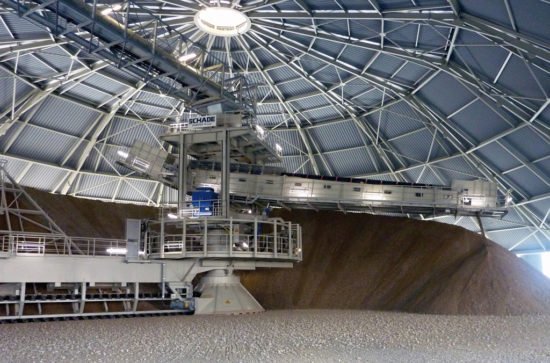AUMUND NEWS 4/2023 – Products. Projects. Progress
AUMUND Fördertechnik
Industrialist, Inventor, University Professor
Foundation of the success of the AUMUND Group
On the 150th birthday of Heinrich Aumund

Prof. Dr Heinrich Aumund, born on 10th April 1873, led a fulfilled, creative and many-sided life as an inventor, industrialist and scientist. He pursued his goals tenaciously, relentlessly and courageously. In his long career he acquired over 200 patents which still, even over 60 years after his death in 1959, form the basis of the constantly improving know-how in the AUMUND Group which today enjoys international success. The Rail Wagon Tippler and the Steel Plate Conveyor are representative of this. Heinrich Aumund was also responsible for starting the outstanding philanthropic activities of AUMUND. Currently this achievement is being honoured by the Franz-W. Aumund- Stiftung in its funding of the Prof. Heinrich Aumund Endowed Chair, with its practical and interdisciplinary research aimed at projecting the mindset of Heinrich Aumund into today’s world.

The Rail Wagon Tippler achieves world renown
On 3rd August 1922 in Berlin Heinrich Aumund founded the Gesellschaft für AUMUND-Patente MB.H. Its function was the exploitation, monitoring and marketing of existing and future national and international AUMUND patents. One of these was the patent registered to Heinrich Aumund in 1929 for the Rail Wagon Tippler for unloading coal. Before studying mechanical engineering Heinrich Aumund completed an internship in an engineering factory, and at the young age of 19 received his first patent, for a pump for an ammonia compressor.



The continuous conveyor – today more relevant than ever in conveying technology
A second pillar which still excels today is the continuous conveyor. This was first developed by AUMUND as large plate conveyor and put into operation for material transportation in mines underground, and later progressively into other industries. A wide range of supported plate conveyors, the Pivoting Pan Conveyor and the curved Pan Conveyor followed, until this type of sectional steel conveyor established itself all over the world for the transportation of bulk materials.
At 85 years of age, two years before his death, Heinrich Aumund submitted his final patent applications, and was working on publishing the 4th edition of his handbook “Lifting and Conveying Equipment.”

the Allrounder
Germany’s “Conveying technology Pope” with close connections to the sciences
In professional circles Heinrich Aumund was considered the “Pope” of conveying technology. Part of what led to this reputation was that as an industrialist he wanted to promote a close connection between science and practice. In 1909 at the age of only 36 he was appointed full professor at the Gdansk University of Technology.
In order to rebuild and reform the university system after the First World War, Heinrich Aumund was tasked in 1920 by the Ministry of Culture with the administration of all technical universities in Germany, and relieved of his teaching activities. His role was principally to consolidate the existing discussion around reform and to transform it into tangible measures.
Aumund Endowed Chair – the circle is closed
In April 2022, on the occasion of the 100th anniversary of the company, Franz-W. Aumund, Founder and Chairman of the Board of the Franz-W. Aumund-Stiftung, erected an ideological monument to his grandfather with the establishment of the Prof. Heinrich Aumund Endowed Chair at Berlin University of Applied Sciences. The chair, “Industrial Sensor Technology and Predictive Maintenance 4.0” represents practical and interdisciplinary research, and projects the mindset of Heinrich Aumund into today’s world.
Committed to social issues
During the professorship which Heinrich Aumund took up in October 1925 at the Technical University in Berlin, the support of employees and students was a matter close to his heart. As President of the “Studentenhaus” association, Heinrich Aumund worked in student welfare in Berlin-Charlottenburg, and was closely connected with the headquarters of the German students’ union in Dresden, with corporations in Berlin, women’s welfare and the students’ union in Berlin. At the end of the First World War he had already been helping with the reintegration of returning students, ensuring they were provided with meals as well as a place at university.
After the National Socialists removed Heinrich Aumund from the university service on 30th September 1935, mention of his achievements, including his major contribution to the concept and implementation of the student house, was systematically silenced. The building exists to this day in Berlin’s Hardenbergstraße as a student hall of residence, with the name “Studentenhaus” at the entrance.

Commitment to social issues and educational funding, especially for young people, is an AUMUND tradition spanning three generations. Beginning with the support of needy students by Heinrich Aumund, it was continued in the 1970s by his son Günter-Claus Aumund who initiated the vocational training centre in Rheinberg. In the era of Franz-W. Aumund, philanthropic commitment was greatly expanded, with measures such as the creation of his private foundation, Franz-W. Aumund- Stiftung in 2006, and the beginning of social activities by the AUMUND companies in 2007. In 2019 the Aumund Foundation, Franz-W. Aumund’s second privately funded organisation followed, established to work specifically on overseas projects in education and medicine.

Contact
If we can help you with any further information, please use the contact form to get in touch.
You will receive an immediate automated acknowledgement, and we will respond to your enquiry as soon as possible.
Many thanks
AUMUND. SCHADE. SAMSON.










